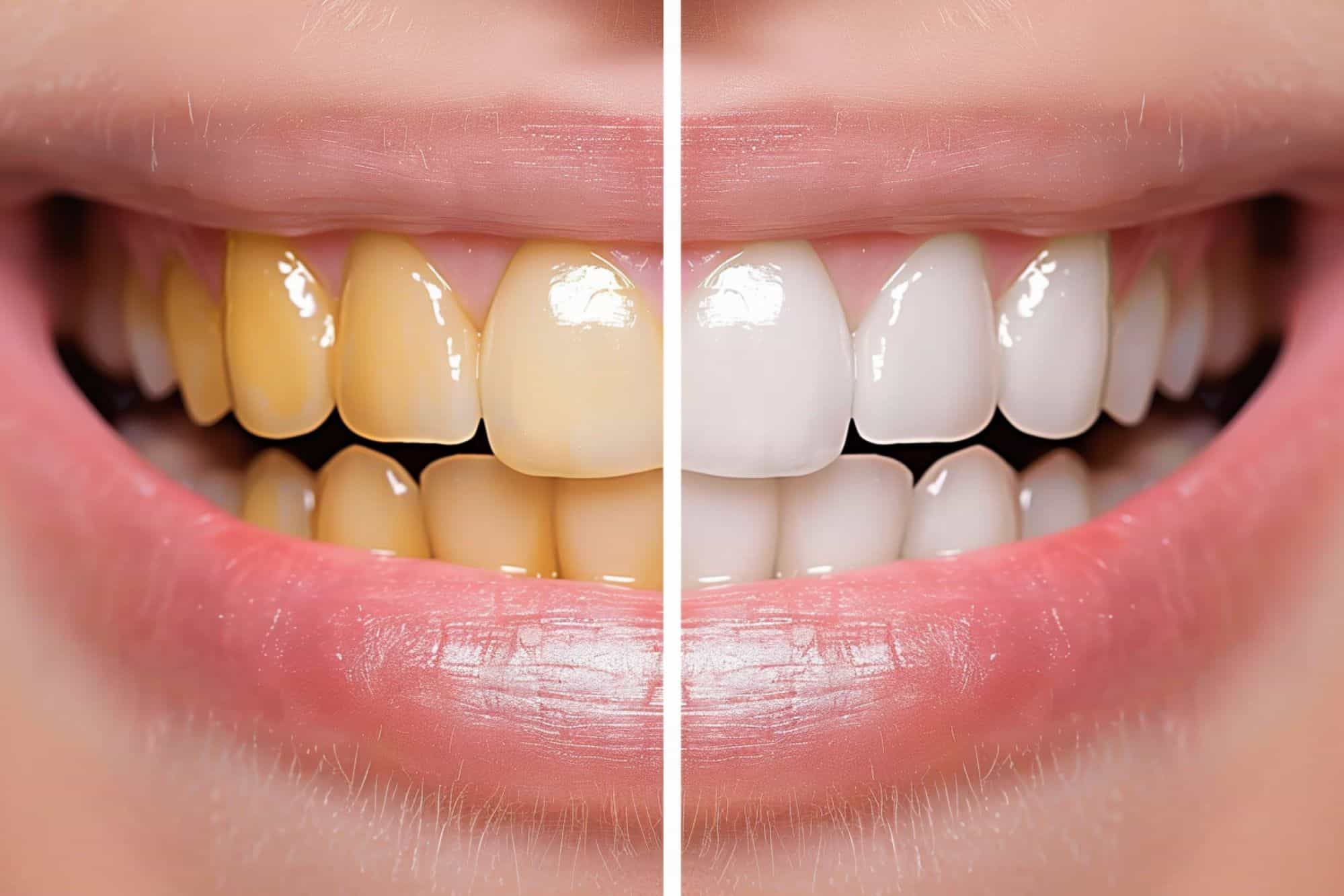Welcome to our latest blog post where we explore safe teeth whitening methods! Having a bright, white smile can boost your confidence, but it’s essential to choose treatments that are not only effective but also safe for your oral health. Let’s dive into the world of teeth whitening and discover the safest options available.
Understanding Teeth Whitening
Teeth whitening is a popular cosmetic procedure aimed at removing dental stains and enhancing the brightness of your smile. It’s particularly sought after because it can significantly improve one’s appearance quickly.
How Teeth Whitening Works
The process of teeth whitening involves using bleaching agents like hydrogen peroxide or carbamide peroxide. These chemicals break down stains on the teeth, which can be caused by foods, drinks, or smoking.
The active ingredients in whitening products react with the discolorations on your enamel, lifting them away and leaving your teeth several shades lighter. This process can be performed either in a dental office or at home with a kit recommended by a dentist.
Safe Teeth Whitening Methods
Professional Whitening Treatments
One of the safest and most effective methods for whitening teeth is to undergo professional treatments in your Naperville dental office. Dentists use higher concentrations of whitening agents than those found in over-the-counter products, but the process is carefully monitored to ensure safety.
Techniques like laser whitening, where a laser activates the whitening compound, have been shown to provide impressive results without harming the tooth enamel.
At-Home Whitening Kits
If you prefer to whiten your teeth at home, it’s crucial to use products recommended by a dentist. These kits typically include custom-fitted trays and a gentler bleaching agent than those used in-office.
This method ensures the whitening solution stays in contact with your teeth for the right amount of time, minimizing the risk to your gums and maximizing the effectiveness of the treatment.
Natural Remedies
While natural remedies like baking soda or apple cider vinegar are often touted for their whitening effects, their safety and effectiveness are not as well-established as professional treatments. These methods can sometimes be too abrasive, leading to enamel damage over time. It’s best to consult with your dentist before trying any natural whitening methods.
NOTE
Understanding safe teeth whitening methods can help you choose a method that suits your lifestyle while ensuring the health of your teeth remains a top priority.
Factors Affecting Safety in Teeth Whitening
Product Ingredients
The safety of a teeth whitening method largely depends on the ingredients used in the whitening products. Hydrogen peroxide and carbamide peroxide are common, but their concentrations must be suitable for safe use.
High concentrations can offer quicker results but might also pose risks like tooth sensitivity and gum irritation. It’s important to use products with concentrations that are effective yet mild enough to avoid damaging your teeth and gums.
Application Techniques
How you apply the whitening product also plays a crucial role in its safety. Over-the-counter strips and trays might not fit perfectly, leading to the bleaching agent leaking onto your gums, causing irritation or damage.
Custom trays from your dentist are designed to fit your teeth precisely, ensuring the whitening agent remains where it should and reduces the risk of gum exposure.
Using the right ingredients and application techniques can significantly influence the safety and effectiveness of your teeth whitening experience. By choosing wisely and consulting with your dentist, you can achieve a brighter smile without compromising your dental health.
Choosing the Right Whitening Method
Assessing Your Teeth’s Condition
Before deciding on a teeth whitening method, it’s essential to assess the condition of your teeth and gums. Not all types of discoloration can be treated with whitening products. For example, intrinsic stains—those within the tooth structure—may not respond well to bleaching and might require alternative cosmetic treatments like veneers.
Your dentist can help evaluate your dental health and recommend the most appropriate whitening approach…
Your dentist can help evaluate your dental health and recommend the most appropriate whitening approach based on the type of stains and the condition of your enamel.
Consulting with a Dental Professional
Consulting with a dental professional is critical in selecting a safe and effective teeth whitening method. Dentists in Naperville can provide personalized advice based on a thorough examination of your oral health.
They can also ensure that the whitening process is tailored to your needs, taking into account factors like existing dental work, sensitivity issues, and overall dental health. This personalized approach helps prevent potential side effects and maximizes the effectiveness of the treatment.
Choosing the right whitening method involves understanding your dental health and seeking professional guidance. With the right approach, you can ensure that your teeth whitening procedure is not only effective but also safe.
Maintenance and Care After Whitening
Post-Whitening Care
After undergoing a teeth whitening treatment, maintaining the results is crucial. It’s important to follow a strict oral hygiene routine that includes brushing twice a day and flossing daily.
Additionally, avoiding substances that can stain your teeth, like coffee, tea, and red wine, can prolong the effects of whitening. Dentists also recommend regular check-ups to monitor your oral health and touch-up treatments if necessary.
Avoiding Common Risks
To minimize the risks associated with teeth whitening, it’s important to adhere to the care instructions provided by your dentist. Overusing whitening products can lead to tooth sensitivity and damage to your enamel.
Be cautious with the frequency of home treatments and always use products as directed. If you experience any discomfort or unusual symptoms after whitening, consult your dentist immediately.
Taking proper care of your teeth after whitening not only helps maintain your bright smile but also ensures the health of your teeth and gums. Good practices and regular dental consultations in Naperville clinics can keep your smile looking great without compromising your oral health.
Frequently Asked Questions
Is teeth whitening permanent?
Teeth whitening is not permanent. Results can last from a few months to up to three years, but this varies greatly depending on individual habits and oral hygiene. Regular exposure to foods and drinks that stain teeth, such as coffee, tea, and soda, can shorten this duration. Using touch-up kits as recommended by your dentist can help maintain the brightness.
Can whitening damage tooth enamel?
When done correctly and under the guidance of a dental professional, teeth whitening is very safe and does not damage tooth enamel. The key is to use approved products and follow the recommended procedures. Overuse or incorrectly using high-concentration bleach can cause damage, so adherence to guidelines is crucial.
What are the risks of DIY whitening methods?
DIY whitening methods, such as using baking soda, lemon juice, or other abrasive substances, can be risky. These methods might offer temporary whitening but can cause damage to the enamel over time, leading to increased sensitivity and susceptibility to cavities. It’s always safer to consult with a dentist before trying home remedies.
How often can I safely whiten my teeth?
The safe frequency for teeth whitening depends on the method used and your dental health. Generally, for professional whitening, once every 1-2 years is adequate, while at-home kits might require more frequent use, such as once every six months. Always follow the specific guidelines provided by your dentist to avoid over-whitening and potential damage.
Conclusion
Choosing safe teeth whitening methods ensures not only a brighter smile but also maintains your oral health. Always consult with a dental professional to select the most suitable and effective treatment for your needs. Remember, the best smile is one that’s healthy and well-cared for!

